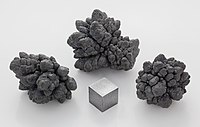
Photo from wikipedia
Organic sediments in aquatic ecosystems are well known sinks for nutrients, silicon, and metal(loid)s. Organic matter-consuming organisms like invertebrate shredders, grazers, and bioturbators significantly affect element fixation or remobilization by… Click to show full abstract
Organic sediments in aquatic ecosystems are well known sinks for nutrients, silicon, and metal(loid)s. Organic matter-consuming organisms like invertebrate shredders, grazers, and bioturbators significantly affect element fixation or remobilization by changing redox conditions or binding properties of organic sediments. Little is known about the effect of filter feeders, like the zebra mussel Dreissena polymorpha, an invasive organism in North American and European freshwater ecosystems. A laboratory batch experiment exposing D. polymorpha (∼1200 organisms per m2) to organic sediment from a site contaminated with arsenic, copper, lead, and uranium revealed a significant uptake and accumulation of arsenic, copper, iron, and especially uranium both into the soft body tissues and the seashell. This is in line with previous observations of metal(loid) accumulation from biomonitoring studies. Regarding its environmental impact, D. polymorpha significantly contributed to mobilization of silicon, iron, phosphorus, arsenic, and copper and to immobilization of uranium (p < 0.001), probably driven by redox conditions, microbial activity within the gut system, or active control of element homeostasis. No net mobilization or immobilization was observed for zinc and lead, because of their low mobility at the prevailing pH of 7.5-8.5. The present results suggest that D. polymorpha can both ameliorate (nutrient mobilization, immobilization of toxicants mobile under oxic conditions) or aggravate negative effects (mobilization of toxicants mobile under reducing conditions) in ecosystems. Relating the results of the present study to observed population densities in natural freshwater ecosystems suggests a significant influence of D. polymorpha on element cycling and needs to be considered in future studies.
Journal Title: Chemosphere
Year Published: 2017
Link to full text (if available)
Share on Social Media: Sign Up to like & get
recommendations!